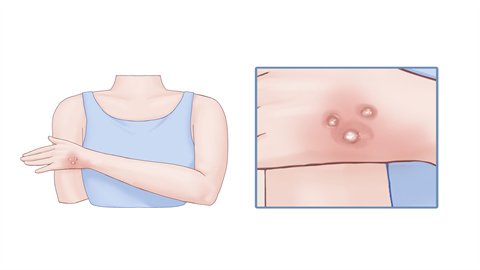How to treat vesicular eczema
In general, the treatment methods for vesicular eczema mainly include general management, topical medication, systemic drug therapy, traditional Chinese medicine (TCM) treatment, and physical therapy. Specific analysis is as follows:
1. General Management
Patients should keep the affected skin clean and dry, avoiding scratching or friction that may cause blisters to rupture and lead to secondary infection. In daily life, loose, breathable cotton clothing should be chosen to reduce skin irritation. Contact with irritants such as soap and detergents should be avoided. Additionally, dietary adjustments are recommended—spicy foods, seafood, and other allergenic foods should be limited—to create a favorable environment for skin healing.

2. Topical Medication
Topical treatment is a common approach for vesicular eczema and should be selected based on the nature of the skin lesions. If blisters remain intact, calamine lotion may be used under medical guidance to soothe itching and promote drying. If blisters have ruptured with exudation, wet compresses with 3% boric acid solution can help reduce inflammation and swelling. Once exudation decreases, topical corticosteroids such as hydrocortisone butyrate cream or mometasone furoate gel may be applied to alleviate inflammatory reactions.
3. Systemic Drug Therapy
For severe or widespread eczema, systemic medications may be prescribed. Antihistamines help relieve itching; commonly used drugs include ebastine tablets, levocetirizine hydrochloride oral solution, and desloratadine syrup. If a secondary infection is present, antibiotics such as amoxicillin capsules or cefuroxime axetil tablets may be used under a doctor’s supervision to control the infection.
4. Traditional Chinese Medicine (TCM) Treatment
According to TCM, vesicular eczema is often associated with internal accumulation of damp-heat or spleen deficiency with excessive dampness. Treatment focuses on clearing heat, eliminating dampness, strengthening the spleen, and resolving dampness. Under medical guidance, oral herbal medicines such as Shiduqing capsules or Danggui Kushen pills may be used. Herbal washes made from decoctions of plants like Portulaca oleracea (Ma Chi Xian) and Phellodendron bark (Huang Bai) can also be applied via wet compress to relieve itching and inflammation. Acupuncture may help regulate qi and blood flow; key points such as Quchi (LI11) and Xuehai (SP10) are often selected to assist in symptom improvement.
5. Physical Therapy
Physical therapy can serve as an adjunctive treatment to alleviate symptoms of vesicular eczema. A commonly used method is narrowband medium-wave ultraviolet (NB-UVB) phototherapy. This treatment helps reduce skin inflammation, relieve itching, and accelerate lesion recovery. It is particularly suitable for patients with chronic or refractory eczema and must be administered under the supervision of a qualified physician.
In addition, during treatment, patients should strictly follow medical advice regarding medication use and attend regular follow-up visits. If abnormal conditions such as expansion of skin lesions or increased pain occur, prompt medical consultation is necessary to adjust the treatment plan.




